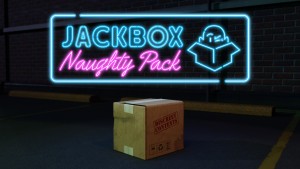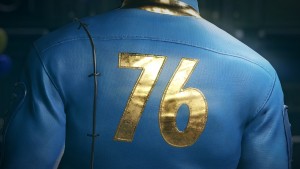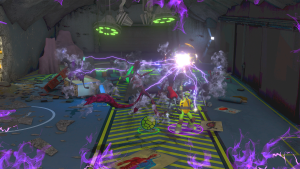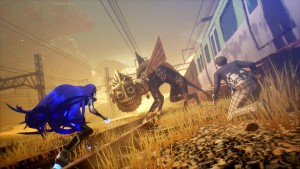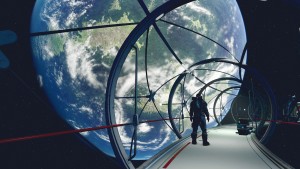Please support Game Informer. Print magazine subscriptions are less than $2 per issue
Does Destiny’s Refer-A-Friend Program Work?

We’ve spent a lot of time since Destiny’s announcement in 2013 discussing the things we like about it. For some of our editors, Destiny has become a weekly or nightly part of our gaming hobby, and a place where we’ve made new friends and sunk hundreds of gaming hours. You can read our enthusiastic review of The Taken King if you're curious. But for some of our editorial team, the game never resonated, and we're interested in hearing that perspective as well.
With Destiny’s newly launched Refer-A-Friend program, we thought it was the perfect time to get their take. I sat down with fellow editors Joe Juba and Matthew Kato, for two days of gameplay to give them a taste of Bungie’s open-world shooter, and then we had a frank conversation about what worked for them, what didn’t work, and whether Destiny might have the power to convert a non-believer.
Miller: Let’s set the stage here a little bit. I’ve been playing Destiny pretty religiously since launch, and I’m always happy to have the opportunity to play with new folks. With the recent addition of the Refer-A-Friend program, you two kindly agreed to hop in and play some of The Taken King for the first time. What’s been your background with the game prior to now?
Kato: All I knew about the game before now is overhearing you, Andy, and others talk about the game – which was unfathomable. And now that I’ve played the game, I still can’t parse some of the terminology you guys throw around!
Joe: Yeah, this was basically my first attempt at spending any real time with Destiny, and I generally agree with Kato. I know what “glimmer” and “engrams” mean now, but it feels like there are still multiple layers of the game that I haven’t experienced. I’d still be lost in any conversation about Destiny that lasted more than a few minutes.
Kato: I think “engrams” are used in Scientology, right?
Miller: So, did that confusion translate to you not enjoying your time with the game?
Kato: Actually, I did like some portions of the game. The loot loop is seriously addictive, and I can recognize the gunplay as being pretty tight. Par for the course for Bungie, however, the vehicles feel like crap, but that’s a very minor point.
Joe: I think the problem is that, after spending several hours playing, I still don’t feel like I know enough about the game and its systems to make any real judgments. That’s actually a problem with the Refer-A-Friend program; I feel like I was just thrown into the deep end. It presents itself as an easy way to bring new players into the experience, and pushes you to rapidly catch up to your friend, but then it still requires dozens of hours of dedicated play to appreciate what the game has to offer. Even though I was having fun, without you there to hold my hand through missions, I had a hard time making sense of everything.
Kato: At one point it was like Miller was running a training session in a call center. He was standing between my desk and Joe’s explaining different things to us both simultaneously.
Next Page: We discuss the merits of new players starting from scratch, or taking the offer to jump straight to level 25

Miller: Yeah, there’s no doubt that Destiny has a lot of mechanics at play; it can be pretty overwhelming. Let’s talk for a minute about the actual system that drew us in to try this little experiment -- the Refer-A-Friend program. For those not in the know, this is a recruitment effort that lets a veteran player meet up with a new player of The Taken King, and by playing together through particular events, both the new and experienced player get some cool rewards. Some of the Destiny community has reacted negatively to the program, because they’re not able to access these new rewards without finding a brand new player to pull into the game – which is, of course, the point. Bungie and Activision want to continue to grow their player base, and they hope this will bring some new folks into the fold. What did you guys think of the program, and the surrounding missions?
Kato: I started out as the ultimate guinea pig – a person who’s never played Destiny starting at level one and going from there. While I did find Bungie’s overall jargon-porn approach to shoving as much lore as it can into players faces in lieu of a story a little off-putting, getting into the flow of the gameplay and character customization loops is easy. So, in some ways Bungie makes it easy because you soon learn to ignore the story and just go shoot stuff up. I also thought that going from level one to level 10, for instance, was a fairly easy, quick experience.
Joe: I was frustrated by the friend-specific missions before long. I like the normal co-op stuff, and felt like it gave me a good basis to see what the basic action and activities are about in Destiny. But then we got to a mission that required a Crucible victory, which is just a terrible idea. First of all, I’m not that interested in PvP (and I imagine many new players would be in the same boat). Second, I was still learning the basic gameplay mechanics, and didn’t have the chance to learn anything about the different weapons’ advantages. Lastly, the Destiny PvP community is clearly dedicated, and throwing a new player into a match with people who have been honing their skills for months is not smart – particularly so early in the Refer-A-Friend quest sequence. Making newcomers get killed for several matches by more experienced players seems like a sure-fire way to turn people off rather than attract them.
Miller: Speaking from the veteran player standpoint, I was also surprised that the particular quest step you’re talking about was included. I do think that it’s great that in introducing the game to new players, they steer you towards Crucible; it’s a big part of the game! However, demanding a win before you can progress to the next step seems like a bad idea. Depending on the whims of matchmaking, that could take some time. For instance, when Kato and I ran a match, we won our very first match. But Joe and I ended up in a match against a really strong team, and his first experience of PvP was getting absolutely crushed, which isn’t much fun. With that said, getting into PvP in any game is a bit of a challenge, and it takes a while for any system to learn where to place a player in the matchmaking ladder.
Kato: Yeah, and by the way, in our second Crucible match, I got smoked. I went from patting myself on the back after the first one for eight kills, and only got one in the second match. That being said, if all the newbies are being brought in with level 40 vets, I imagine you’re going to get some joy even if you have some rough matches. And as a low-level player, I actually got multiple requests from high-level characters who wanted to pair up with me simply so they could get the co-op, Refer-A-Friend goodies (and it had nothing to do with my personality), so if you’re entirely new you’ll likely find someone to help you out in a variety of ways.
Joe: I like the sense of cooperation that the Refer-A-Friend encourages, but as a new player, I didn’t like how I was almost entirely dependent on Miller. For example, we had been doing The Taken King questline together (after I bailed on the PvP). So, when I was playing by myself, I decided to continue that sequence. I took a mission with a recommended level of 31 (my level at the time), and it felt practically impossible to complete legitimately. I found a little rock that I could crouch behind where the boss couldn’t hit me, so I just popped out occasionally and took potshots, wearing the beast down. Now, you can talk to me about “light value” or how that’s just a tough mission in general, but that doesn’t change the bottom line: The mission said “31.” I was 31.
Kato: Hey man, taking potshots – that’s how I make a living!
Joe: It’s not like I don’t enjoy a challenge, but I felt like I had no chance at finishing that mission for real unless a more experienced player was helping.
Miller: For longtime players, I think it’s easy to forget that certain systems or gameplay mechanics we take for granted are total mysteries to someone who hasn’t played before. The mission you’re talking about, Lost to Light, is one that many of us have done dozens of times, particularly because it’s the gateway to the Black Spindle exotic quest. That Ogre boss is one that many of us have killed a bunch of times, but as a brand new player with mostly green gear, and no back-up, he can be really challenging.
Joe: Exactly. When I was playing solo, I wasn’t sure what content I should (or shouldn’t) be attempting.
Next Page: Confronting Destiny's progression system, and the most confusing features of Destiny for new players

Miller: Let’s talk a little bit about the progression system. We kind of experimented a little bit as we were doing this. Kato went in and leveled naturally without using a Spark of Light (which jumps you up to level 25). And Joe went in and immediately popped up to 25, and then began doing Taken King content. I played with both of you independently, and then we did a few things together as a fireteam of three, including a couple of strikes. Did either of you have strong feelings one way or the other about which is the right way to go – leveling naturally, or catapulting up to 25?
Kato: As the person starting from scratch, I felt disorientated for a little while, but I also felt like playing as a low-level person with level 40s wasn’t a totally untenable concept. I think I contributed and wasn’t a continuous respawn burden or something. Being able to play in some zone public events was cool. I also liked the feeling like I was “earning” those first 10 levels.
Joe: Starting at level 25 feels like the Destiny equivalent of a get-rich-quick scheme: all the payoff for none of the effort. I wish I would have started from scratch like Kato. It’s not necessarily about the narrative preamble, but I would have been more comfortable with the different facets being layered on (like your super, sparrow, light, available locations, etc) in the order Bungie originally intended, rather than just having it all dumped in my lap without working for them or understanding their significance.
Miller: If I was a new player, I’d be really torn about how to proceed on that front. The jump to 25 would let me join up with my experienced friends a little faster, but you’d lack that context that you get by playing the whole base game and the early expansion content. Ultimately, it’s likely to come down to how you’re planning to play the game. If you’ve got a lot of friends already at level 40, you probably just want to catch up as quickly as possible. If you’re trying Destiny for the first time just for the sake of giving it a shot on your own, I might recommend not using the Spark of Light (at least for your first character), and experiencing the natural leveling process. Despite some shortcomings in the Year One content, I honestly believe there’s a lot to enjoy there.
Both of you alluded to being a little bit lost and confused as new Destiny players, even with somebody on hand to explain stuff as you encountered weirdness. What was the single feature or aspect of the game that was (or is) the biggest mystery to you?
Kato: Sounds dumb, but I actually think it’s the way every simple action you do is veiled in this Destiny terminology that references lore that hasn’t even been explained yet. Maybe it’s breaking the fourth wall or unimaginative to explain missions and weapons and leveling in really understandable terms that gamers already know, but sometimes my eyes would glaze over at all the terminology. In the time that I played, I felt in the dark as to why I should join a faction, change my ship, what the equipment colors are all about, etc. until Miller explained it all to me.
Joe: I don’t think it’s one single element that is confusing. Things like bounties, item upgrading, and ability progression all make sense eventually. It’s more of an aggregate effect. A lot of small things seem poorly designed and/or explained early on, which can be overwhelming and discouraging for the new batch of Refer-A-Friend players. At least the gunplay is fun, though.
Next Page: What can Destiny do to appeal to new players, and the importance of hearing what new players think

Miller: Both of you are players who enjoy science fiction in games like Mass Effect or Metal Gear, and from many conversations over the years, I know you both enjoy a solid progression loop of improving your character and maxing out stats and making your character look cool, like you see in games like Diablo or Fallout. But it sounds like Destiny only partially scratched that itch for both of you, at least in the limited time you played. What would Destiny need to do to differently to capture your interest?
Joe: I always like getting weapons and gear with higher numbers, no matter the game, so that was fun. But I didn’t get as excited about the character customization angle in Destiny. I think part of has to do with the visual style of the game. The graphics are technically fantastic, but its overall sci-fi aesthetic just doesn’t do it for me. Ultimately, I think my character looks sort of lame no matter what he’s wearing, so it’s hard to care too much about it.
Kato: The improvement/gear loop was the one thing that made me come back for more, and still has me thinking about playing the game at home. As far as what it lacks, I would say that the story lost me pretty early on. Now, as a Metal Gear fan, I’m not going to defend that series’ obtuse story nature, but in an average game, the mission-to-mission story is usually strong enough of a thread to carry you through. This felt more like just dropping into an environment to kill whatever spawned in front of your scope. I realize that’s what 90 percent of the games we play really are, but this felt more bare than the rest.
Miller: I’ve remained pretty quiet (against my instincts) about defending the game as you guys are expressing your opinions, because I think we’ve had lot of opportunities on our site in the last year to praise Destiny, but we rarely hear from our writers who aren’t into it as much. I think the first instinct for many veteran players would be to tell you how wrong you are about PvP, or the game’s challenge level, or its progression, but I think there’s a lot of value in hearing what doesn’t work about the game for new players, as that’s key to how Destiny will or won’t stay vibrant and compelling over the coming years.
Most of our editorial staff had already played Destiny to some degree in recent months, but both of you hadn’t yet checked it out, so I was really curious about what your take would be.
I hope that one or both of you might consider playing some more at some point beyond today, as I’d argue that Destiny reveals a lot of its charms over time. I think it would be hard, even after several hours, to see why this game is so fascinating to so many millions of players, and why anyone would invest hundreds (if not thousands) of hours into the experience.
Joe: Yeah, I should clarify: I don’t think Destiny is a bad game. My favorite games would seem absolutely terrible if you just dropped a new player in the middle of them, but Destiny doesn’t. Most of my complaints really come down to the presentation of Refer-A-Friend being beginner-friendly, but then making few accommodations to actually ease them into the experience. As for the core game, I can see the appeal of the loot-loop, and it’s always fun to see a character that you’ve invested time in get more powerful. I’m glad I had a chance to play – though I don’t think this particular avenue of entry was ideal for me.
Kato: I think the referral program is a good one and it has mechanisms that help new players. Of course, whether you keep playing is going to be down to how much the game itself captures your imagination, but it certainly tries hard.
Miller: I’m glad we had a chance to play together. I’m bummed that more of the game didn’t snap into focus in those early hours, but I’m not totally surprised; there’s a lot to wrap your head around. And given that both of you had held off on checking out Destiny for such a long time, I had a suspicion that something might not totally click right away. Regardless, if either of you decide you’d like to give the game a little more time, I’d love to play some more with you. And speaking for the broader Destiny community, I know that sentiment extends beyond me. It’s a pretty friendly game community that is eager to help and introduce things to new players. That’s a pretty active part of the way many people play Destiny, actually. I bet a lot of players out there in the Destiny community would be eager to play with you, or any other new player, and expand their friend list, as that’s a big part of what makes the game so much fun in the long term.
As for the Refer-A-Friend program, as a longtime player, I’m ambivalent. I think it’s admirable that Bungie and Activision have crafted some fun rewards for people interested in bringing a new friend into the fold, but I can see why that’s going to be frustrating for many who already brought their friends in months ago, and now they can’t get that fun exclusive loot. And while the questline itself is pretty straightforward, it’s certainly not just a brief intro experience. In the couple of days that Kato, Joe, and I played together, we only got through part of the questline, and only the first few rewards. To fully play through “A Tale of Two Guardians,” (the new quest line) you’d need to eventually get your buddy all the way to level 40, and even have them ready to tackle a Nightfall for the final step; that’s a big time investment for someone who might just be curious to try the game out in a more casual way. But at the end of the day, it’s good for everyone in the Destiny community when new players come in; I think this program is a solid start to that effort in the middle of the game’s second year, even if I hope that Bungie continues to work on refining how it recruits new players into the fold.


